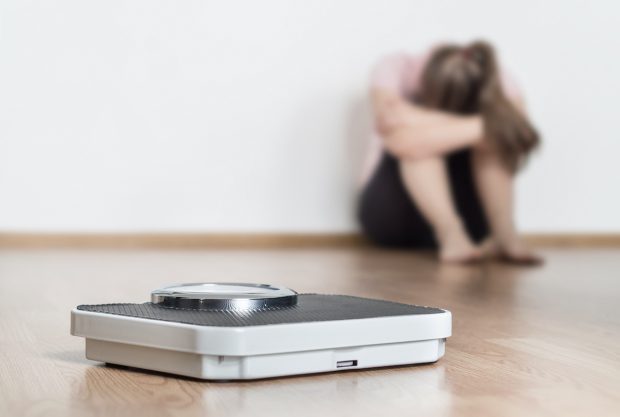After initial rounds of success, you’ll eventually reach a plateau in your weight loss.
You may be saying to yourself, “damn it, why am I not losing more weight?” You’re putting in the effort, never missing a workout and you’re eating healthily, but the scale isn’t budging. But before throwing in the towel, take a deep breath, count to ten, and try not to smash the scale against the wall.

Welcome to the most annoying phase of your weight loss—the plateau phase. Even though the pounds are tumbling off in the beginning, your scale will eventually start to stagnate. Don’t panic! Plateaus are quite normal during the process of losing weight. Think of them as challenges you can eventually overcome. Let’s take a look at how you can climb over this wall and continue on your path towards weight loss.
Lose Weight With a Negative Energy Balance
As long as your caloric intake is less than what your body expends, you’ll continue to lose weight. It’s as simple as that!
Since our body is not a machine, the weight loss curve is not so straightforward. Your weight can fluctuate greatly in a single day. This depends on the time of day when you step on the scales, whether you have already worked out or how many calories you’ve already consumed. It’s important to weigh yourself at the same time—when you first wake up in the morning before you’ve consumed any calories.
Possible Causes for a Standstill When Losing Weight

In addition to your caloric intake and weight fluctuations throughout the day, there are other factors that can cause a plateau when losing weight.
1. Carbohydrates Bind With Water
Beware of low-carb diets.
On a low carb diet, like the keto diet, your body turns to glycogen as its main energy source because its glucose stores (carbohydrates) have been depleted. This explains why new low carb dieters see a dramatic initial weight loss ranging from 4 to 12 pounds in the first week. The initial loss is exciting, but it quickly slows to a snail’s pace. The reason? Early weight loss is water weight, rather than fat. Quick water weight loss occurs when metabolizing glycogen (instead of glucose) because the process requires a lot of water.
And because so much water is lost, it looks like you’re shedding inches off your frame. However, as soon as you start eating carbs again, your body readily replaces its glycogen stores. This is one reason why people often see an initial weight gain immediately after coming off a diet, especially if they’ve restricted their carbohydrates. But it’s not fat coming back—it’s all that water lost during the first week of the diet. Now it’s returning! This can significantly influence your result on the scale.
2. Water Retention During Menstruation
During menstruation, the female body often experiences hormone fluctuations, which can lead to water retention in the body’s tissues. Long story short, not only will you experience frequent mood swings but also weight fluctuations. It’s an explosive mixture. The excessive emotions caused by raging hormone and the extra pounds from your menstrual cycle can hardly be avoided. Throughout this period, it’s important to say bye-bye to your scale for a few days because the results can be very misleading.
3. Muscle Weighs More Than Fat
If you’ve made a decision to get fit and feel happy, you should be praised! This means you’ve made fitness and nutrition a priority. But if your scale doesn’t confirm a loss in weight, don’t worry. There’s a simple explanation for this. Exercise builds muscle and muscle weighs more than fat.

Because muscle tissue weighs more than fat, you cannot immediately see that you’ve lost weight. So instead of stepping on the scale, grab the measuring tape instead. You might not have lost weight but you’ve probably lost girth. The increase in metabolism from working out burns more fat, even at rest! This should give you plenty of incentives to keep up the good work.
Crash diets do exactly the opposite. Due to the very low-calorie content, they force your body to attack its muscles instead. You may experience rapid weight loss but what you’re losing is the water bound to stored carbs. Once your carbs are depleted, your body starts attacking your muscles. And as we know, muscle weighs more than fat. That’s why it looks like you’re losing so much weight—it’s muscle weight.
In addition, your metabolism decreases, making further weight loss difficult. Many people, after completing a low-carb/high-fat diet and reestablishing their old eating habits, often develop a pattern called “yo-yo” or weight cycling. They lose weight, gain weight, lose it again and gain it back. This pattern repeats itself over and over, sometimes lasting for many years.
Don’t Give Up!
If you exercise, eat healthily and maintain a negative energy balance, you will lose weight. Plateau phases may occur but they should by no means be an excuse to give up. Just remember, if you consume less energy than you burn, you will lose weight. It’s that simple.
Set Realistic Goals

Don’t assume that you’ll maintain the rapid weight loss you experienced at the start of your exercise and nutrition plan. Be prepared to lose one to two pounds per week at most. Knowing this will shield you from disappointment. Focus more on what you’ve accomplished as opposed to weight loss. How do you look? How do you feel? If you answer “great” to those questions, then you’re well on your way to reaching your goals.
Also, remember how your body looked before you committed to getting fit and feeling happy. We tend to only look at the weekly change on the scale and forget where we were when we started. So, don’t say, “I didn’t lose any weight this week.” Instead, proclaim, “I’ve lost 10 pounds in 5 weeks.”
4 Tips for Avoiding the Plateau
- Don’t weigh yourself every day! Fluctuations will spoil your mood. Please only weigh yourself once a week under the same conditions.
- Grab the tape measure! Use the circumference of your stomach, legs and hips to quickly determine whether your effort has already paid off, even if it’s not yet showing up on the scale.
- Cool your jets! If you stick to it through the plateau, you will resume losing weight after 2 to 3 weeks.
- Keep an eye on the big picture! Don’t judge your weight loss by the weekly results but rather look at your long-term changes.
Healthy Weight Loss With Gymondo
With the Gymondo nutrition plan, you will effectively achieve your goals for the long-term. By combining regular exercise sessions with a healthy, natural diet, your pounds will melt away as you become more fit and active.




Kommentar schreiben